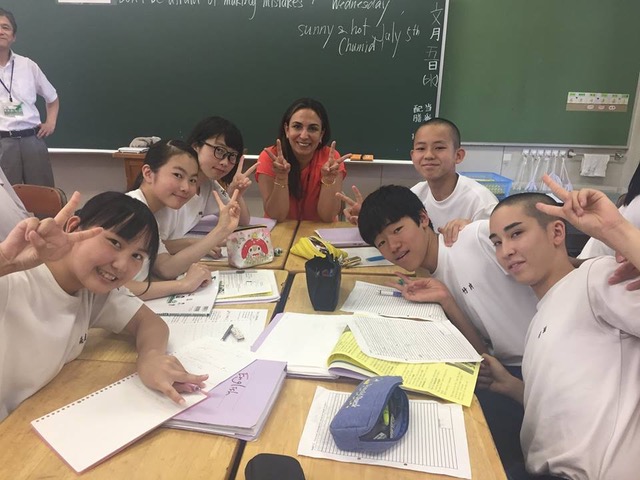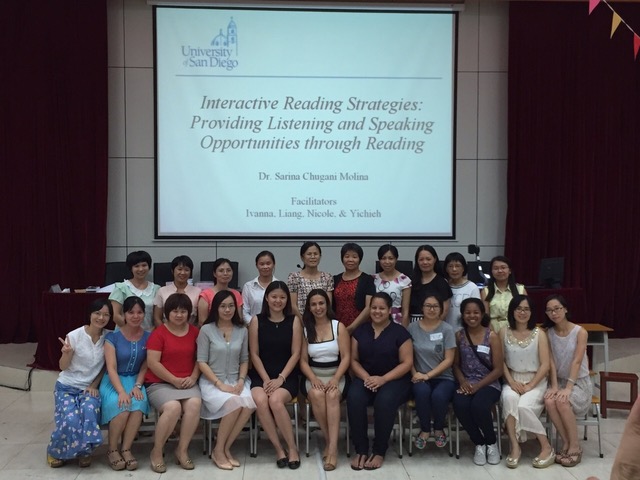Commission for Global Dimensions of Student Development
Monday, 17 December 2018 - 12:08pm
As a teacher educator and English teacher of over 20 years, I have learned much from my work with refugees, migrant, immigrant and international students and teachers both in domestic and international contexts.
As an international student and multilingual user of English myself, I came to realize the different ways in which I conceptualized the world as an English speaker from the East that was quite different from the systems I experienced in the West. Not only did it become important for me to articulate my background and understandings as I negotiated meaning with my American and international friends, I also had to learn to navigate the world of academia without any prior knowledge of the inner workings of the system. I share here two broad areas of research that have informed my work with my international students.

Initiating our international students into the culture of our communities
In any organization, it is important to initiate new members into its system by articulating values, norms and expectations. Likewise, for international students and many multilingual users of English who are not familiar with the world of western academia, it is also important to initiate them into the academic culture and the “know-how” of the system. When speaking with instructors who work with international students, they often state how quiet they are, where they don’t often contribute to class discussions. Lisa Delpit (1988) whose work focuses on working with students of diverse backgrounds in the K-12 arena, proposed five dimensions of the “culture of power” inherent in the classroom that can help us understand why this might be so.
- Issues of power are enacted in classrooms.
- There are codes or rules for participating in power; that is, there is a “culture of power.”
- The rules of that culture of power are a reflection of the rules of the culture of those who have power.
- If you are not already a participant in the culture of power, being told explicitly the rules of that culture makes acquiring power easier.
- Those with power are frequently least aware of – or least willing to acknowledge – its existence. Those with less power are often most aware of its existence (p. 282).
As professionals working with international students, it would be important to become aware of these dynamics within our communities or classrooms and articulate the implicit rules and expectations. For example, we could invite our students into our discourse practices with an understanding that there are different cultural ways of participating in classroom discussions. This may include providing sufficient wait time or opportunities to write before speaking. Frames that provide sentence starters on how to present a new idea, how to add to an idea, how to challenge or respectfully disagree with an idea can be helpful tool for our students who may be new to our academic discourse practice. Within this initiation process, it is also important that our international students feel validated in a culture of care (Valenzuela, 1999). For new international students, it might be important to consider where they may be in their cultural adjustment to the new environment. Initially, they may feel euphoric or go through the “honeymoon” period. As reality sets in, they may become upset or “hostile” to how different the customs and their place is within this new society. Overtime, they will begin to adjust, become aware of and accept the differences, where some may even feel like this new environment feels more like home to them than going back to their home countries, which may generate a form of reverse culture shock. Meeting our international students where they are at is what Valenzuela defines as authentic care, which is “a form of caring that emphasizes relations of reciprocity between teachers and students (Valenzuela, 1999, p. 61).” Réndon (1994; 2009) also calls on teachers to validate their students through a caring relationship, which she describes as “an enabling, confirming, and supportive process initiated by in-and-out of class agents that fosters academic and interpersonal development (Réndon, 1994, p. 44). As we work with our international students in our classrooms, it is important to hold them to a high standard as we do for all of our students. However, Noddings (1984) cautions us that having high expectations can be another form of “product control” unless the teacher is able to “see and receive the other – see clearly what [s]he has done, and receive the feelings in which it was done (p. 196).” What this means is to not only praise the student for what he or she was able to do in their assignments and contributions in class, but show them where they need to go through authentic, honest feedback with an understanding of the different cultural assumptions and practices they may bring to their work. What this means is that having high expectations for all students does not entail watering down the subject matter in any sense (Nieto, 2002), as much as it is providing the appropriate scaffolding to ensure the learning of the desired objectives and goals. Darling-Hammond & Lieberman (2012) believe that this embracing of different cultural assumptions and practices can lead to deeper learning.

Empowering multilingual users of English
In addition to validating our students’ experiences and inviting them into our communities of practice, there are competencies that are important to cultivate for professionals working with international students. The English as an international language framework popularized by McKay (2012), began to challenge the traditional ways in which we approach our non-native speakers of English. Instead of labeling our international students as “non-native” speakers which presumes a deficit perspective, recent research has promoted the use of “multilingual users of English” to capture the rich multicultural and multilingual backgrounds of our students from a strengths-based perspective. As an international student, of Indian descent and born and raised in Japan, I experienced the impact of World Englishes within the global international school and community in which I was raised (Molina, 2014). What became an important competence was attuning to each other with a central focus on negotiating meaning or “multidialectal competence” (Canagarajah, 2006), and having the capacity to negotiate our unique culturally-specific expressions and ideas in English or “meta-cultural competence” (Sharifian, 2009), in order to grow our sense of “global cultural consciousness” (Kachru, 1988), which can expand and deepen individual and cultural understanding among and between users. For teachers, this would entail designing curriculum or activities around promoting these competencies that allow for “bi-directional negotiation of meaning” (Inoue & Molina, 2013), which would invite the students to enter the dialogue around notions of culture, language, and power, while at the same time support them in developing the academic skills necessary to successfully navigate their own paths through the exploration of their own voice (Molina & Manasse, 2015). This would entail selecting critical readings that reflect multiple perspectives as mentor texts that can be discussed both in terms of content and style and developing opportunities to dialogue about unique cultural conceptualizations that often have different layers of meaning depending on where one comes from.
These broad areas of research provide a couple of lenses in which to ground our work with our international students. This opportunity to work with international students, learn from them, and negotiate meaning, I believe, is critical to broadening our worldviews and deepening intercultural and global understandings.
 Bio of Dr. Sarina Chugani Molina:
Bio of Dr. Sarina Chugani Molina:
Dr. Sarina Chugani Molina serves as Associate Professor and director of the M.Ed. in TESOL, Literacy, & Culture program in the Department of Learning and Teaching at the University of San Diego. She has designed and developed TESOL programs for both local and international audiences and conducts teacher training in both local and international contexts. Her research interests include Teaching English as an International Language, supporting the needs marginalized students in academic communities, and teacher development from a constructive-developmental and socio-cultural perspective.

